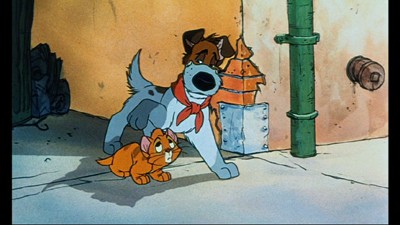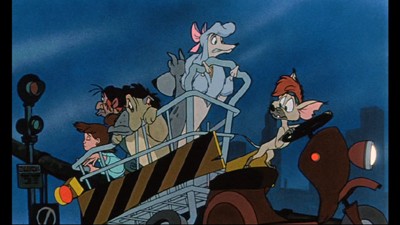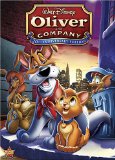| Reviews & Columns |
|
Reviews DVD TV on DVD Blu-ray 4K UHD International DVDs In Theaters Reviews by Studio Video Games Features Collector Series DVDs Easter Egg Database Interviews DVD Talk Radio Feature Articles Columns Anime Talk DVD Savant Horror DVDs The M.O.D. Squad Art House HD Talk Silent DVD
|
DVD Talk Forum |
|
|
| Resources |
|
DVD Price Search Customer Service #'s RCE Info Links |
|
Columns
|
|
|
Oliver and Company
Walt Disney Studios Home Entertainment // G // February 3, 2009
List Price: $29.99 [Buy now and save at Amazon]
 Depending on your point of view, "Oliver & Company" is either the last in a long line of struggles for Disney, who spent most of the 1970s and 80s wandering aimlessly through mediocre projects before "The Little Mermaid" helped kick off the studio's renaissance, or it's a rough but enjoyable early go at the very sort of upgrades for which Ariel would be credited a year later. Either way, the movie is rarely remembered for its story or characters; Disney fans instead often list it as a marking point for the studio's changes to come.
Depending on your point of view, "Oliver & Company" is either the last in a long line of struggles for Disney, who spent most of the 1970s and 80s wandering aimlessly through mediocre projects before "The Little Mermaid" helped kick off the studio's renaissance, or it's a rough but enjoyable early go at the very sort of upgrades for which Ariel would be credited a year later. Either way, the movie is rarely remembered for its story or characters; Disney fans instead often list it as a marking point for the studio's changes to come.That's important, because "Oliver" never quite works, movie-wise. It's harmless enough to offer disposable entertainment, but its story is a mess and its characters are uninteresting. The animation is clumsy, the songs are forgettable, the attempts at late-80s relevance now come across as dated and slightly embarrassing. Even my daughter, age eight, gets quickly bored by it; I don't think she's ever bothered to watch it all the way through, despite multiple attempts.
And yet it's an important part of the Disney canon, wedged squarely between the bland efforts of "The Fox and the Hound" and the vibrancy of later works like "Aladdin." It's here that Disney animators experimented with computer generated images, here that the scribes dabbled in more modern pacing and humor, here that the songwriters stepped slowly back into the waters of all-out musical. "Oliver" is only a so-so movie, but it's a valuable link in Disney history.
Loosely (very, very loosely) adapted from Charles Dicken's "Oliver Twist," the film finds orphan kitten Oliver (voiced by a young Joey Lawrence) stumbling upon a band of dog pickpockets working for human Fagin (Dom DeLuise) on the streets of New York. Oliver's taken with their charms, especially those of the fast-talking, sunglasses-wearing mutt Dodger (Billy Joel, in his only acting role to date). Fagin uses the dogs to steal for him, hoping to pawn the loot to pay off the vicious loan shark Sykes (Robert Loggia). (How often do murderous gangsters factor into Disney cartoons? Especially ones presented as frighteningly as Sykes?)
A failed attempt to steal a radio from a limousine lands Oliver in the arms of Jenny (Natalie Gregory), a young daughter of a rich, always-absent couple. Oliver is taken to Jenny's lush penthouse; this leads first to Fagin kidnapping Oliver, then to Sykes kidnapping Jenny, then to a chase through the New York subway system, including a few moments so violent that only Disney could get away with shoving them into a G-rated movie.
The character of Jenny was originally intended to be Penny from "The Rescuers," but when that plan was abandoned, the filmmakers didn't bother doing much to change her, her first initial notwithstanding. And that's a sign of the film's ultimate problem: laziness. The story, while cute enough to serve as a 74-minute babysitter, is mainly a minimal effort mess of generic characters who do just enough to make them types (the streetwise slickster dog, the gentle idiot dog, the intellectual dog, the spoiled princess dog, the, um... female dog) without having to do much else.
And then there's Tico. Attempts to bring a "hip" 80s sensibility to the proceedings results in Cheech Marin cracking horrible one-liners as a lecherous Chihuahua who says "man" all the time. Other attempts at a modern grittiness come in varying degrees of success - the animation is given a rougher, sketchy, almost Ralph Bakshi look; the uptown penthouse is treated to a brighter, cleaner color scheme than the dank grimy alleyways and riverfronts, creating visual contrast; the use of CG animation to create cars and buildings, while antiquated by today's standards, does create a unique "city" look to the piece - but Marin's obnoxious dialogue reeks of desperation from studio executives struggling to keep up with the MTV generation. Also, it's just plain not funny.
All of this mess might be explained by the astounding count of twenty-one credited writers: thirteen to whip up the story, five more for "additional story material," and three more after that to finalize the screenplay. With that much interference, ideas and noise coming from all sides, it's no wonder "Oliver" looks partly like a movie made by committee, partly like a movie that doesn't really know where it's ever going, and partly like a movie trying to juggle a handful of tones that never click together. "Oliver" occasionally works in pieces, a charming scene here, a clever moment there, but as a whole, it stumbles around, never quite entertaining the way it thinks it is.
Heck, even the music - six songs penned by six songwriting teams working separately - is a clutter, none matching the sound of the other. (Dodger's signature tune, "Why Should I Worry," can't even sound like itself; its chorus sounds spliced in from a completely different tune.)
All of this left "Oliver" a critical bomb upon its arrival in theaters in November 1988. But audiences didn't mind, and they made the film a solid box office hit, enough of a success to jumpstart Disney's flagging feature department.
The film was the last from the studio to not receive an immediate home video release; its eight-year absence from video store shelves served its 1996 theatrical re-release well. That would be one of Disney's last multiplex re-releases, as by that time they had learned how much money they could make instead by reissuing their titles on home video.
But such successes were soon forgotten once "The Little Mermaid" came along, and with it a new view of Disney as a family entertainment powerhouse. "Mermaid," and the films that came after, remain beloved today. "Oliver & Company," meanwhile, hasn't aged nearly as well. It doesn't hold up very well as a story, as an animated work, as much of anything beyond a curious time capsule of a studio just a few steps away from a major change.
 The DVD
The DVD"Oliver & Company" was released on DVD once before, as a "Special Edition" in 2002. That disc, which never went out of print, is now being replaced by a new "20th Anniversary Edition" - a label that's a couple months too late, but who's counting? Almost everything on this new disc is identical to the previous release, including the transfer and the bulk of extras. The only upgrades are the packaging (now with a shiny slipcover!), menu design, previews for other Disney titles, and an interactive game. None make it worth the double dip.
Video & Audio
"Oliver & Company" never really looked good, thanks to rough animation and a dour look centered on muted colors. But even that's not been cleaned up much in this 1.66:1 anamorphic transfer, which comes loaded with film grain and flicker. Compared to other Disney releases, it's obvious very little effort was put into this one.
The Dolby 5.1 soundtrack fares better, if only by default. Most of the action remains up front, with crisp dialogue and a nice depth to the musical interludes. Optional English SDH, Spanish, and French subtitles are provided.
Extras
The only new feature added to this new release is the game "Oliver's Big City Challenge." It's a lengthy, somewhat boring DVD game, with seven tasks of varied levels, ranging from counting sausages to answering character-related riddles to finding differences in pictures. Kids might enjoy it for a while, but it drags on (especially with the lengthy load times for each level), and there's no reward at the end beyond a "good job!" from the peppy narrator. (Presented in 1.78:1 anamorphic widescreen.)
Everything else here is ported over from the earlier Special Edition, with a few notable tweaks. The "Sing-Along" videos for "Why Should I Worry?" (3:25; 1.66:1 anamorphic) and "Streets of Gold" (1:12; 1.66:1) are simply clips from the movie with subtitled lyrics. This is a change from the original disc, which offered music videos for the same songs, taken from an even earlier sing-along video. (That version's music video format offered longer album versions of the songs than seen on this new release, which uses the shorter in-movie edits.)
The "Backstage Disney" section still contains no new making-of information - it's all vintage featurettes produced in 1988 to promote the film's original release. "The Making of Oliver & Company" (5:31; 1.33:1 full frame) sells the movie as a collaboration of classic Disney animation and "hip, new" storytelling. (The narration uses the word "contemporary" and "modern" a zillion times, suggesting the studio was really pushing to look cool in the eyes of kids raised on MTV.) The usual cast and crew interviews are found here, but more interesting are the comments on the use of CG animation; Roy Disney wisely suggests that computers will be the future of cartooning.
"Disney's Animated Animals" (1:28; 1.33:1), meanwhile, tries to go the other way, spinning "Oliver" as part of the studio's decades-old tradition of cute animals. Clips of the film and its making are blended with footage from Disney classics.
The "Oliver & Company Scrapbook" (1.78:1 anamorphic) is perhaps the best extra here, allowing you to scroll through numerous samples of concept art, character models, behind-the-scenes photos, posters, and sketches of unused character ideas.
The "Publicity Materials" section offers up the film's original 1988 trailer (1:33; 1.33:1), a 1988 TV spot (:32; 1.33:1), a trailer for the 1996 theatrical re-release (1:39; 1.33:1), and, curiously, a 1996 EPK featurette titled "Return of a Classic" (1:58; 1.33:1), which attempts to note "Oliver," not "The Little Mermaid," as the film that launched the Disney revival of the 90s.
"Backstage Disney" concludes with a set of "Fun Facts" offering general trivia points on the film.
Two classic Disney cartoon shorts are also included: the 1941 Oscar-winning "Lend a Paw" (8:08; 1.33:1), in which Pluto regrets rescuing a kitten, and 1950's "Puss Café" (7:09; 1.33:1), where a couple of dopey, hungry cats try to outwit a napping Pluto. Both shorts also appear on several other Disney home video releases, including the "Complete Pluto" Disney Treasures DVD sets, making their inclusion here nice, but redundant.
The usual batch of Disney previews rounds out the set. (They've been updated, obviously, from the earlier Special Edition.) These previews also play as the disc loads.
The disc is coded with Disney's "FastPlay" option, for those youngsters who prefer it.
Final Thoughts
Considering the previous DVD never went out of circulation, it's not like Disney is treating us to something rare with this new release. As such, there's no reason for it. It fails to upgrade the Special Edition in any way that matters, and the original release wasn't that hot in the first place. Those of you interested in double dipping should most certainly Skip It.
|
| Popular Reviews |
| Sponsored Links |
|
|
| Sponsored Links |
|
|
| Release List | Reviews | Shop | Newsletter | Forum | DVD Giveaways | Blu-Ray | Advertise |
|
Copyright 2024 DVDTalk.com All Rights Reserved. Legal Info, Privacy Policy, Terms of Use,
Manage Preferences,
Your Privacy Choices | |||||||













